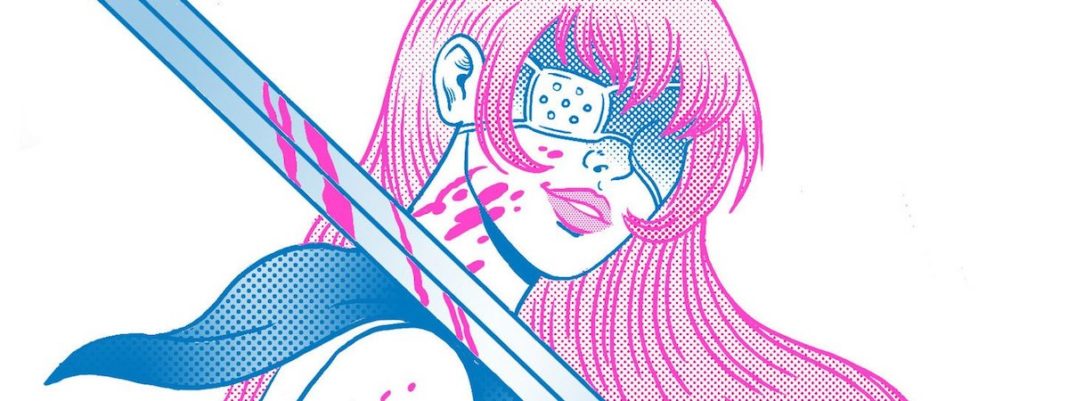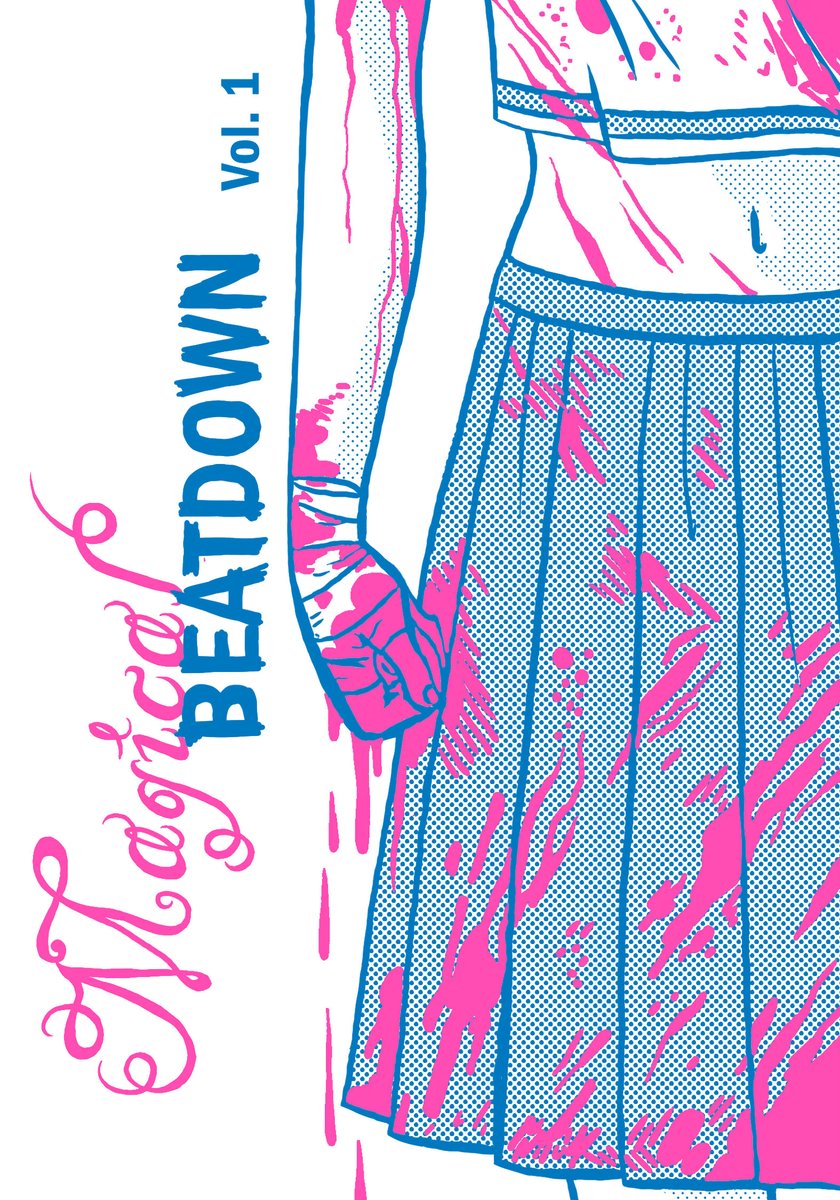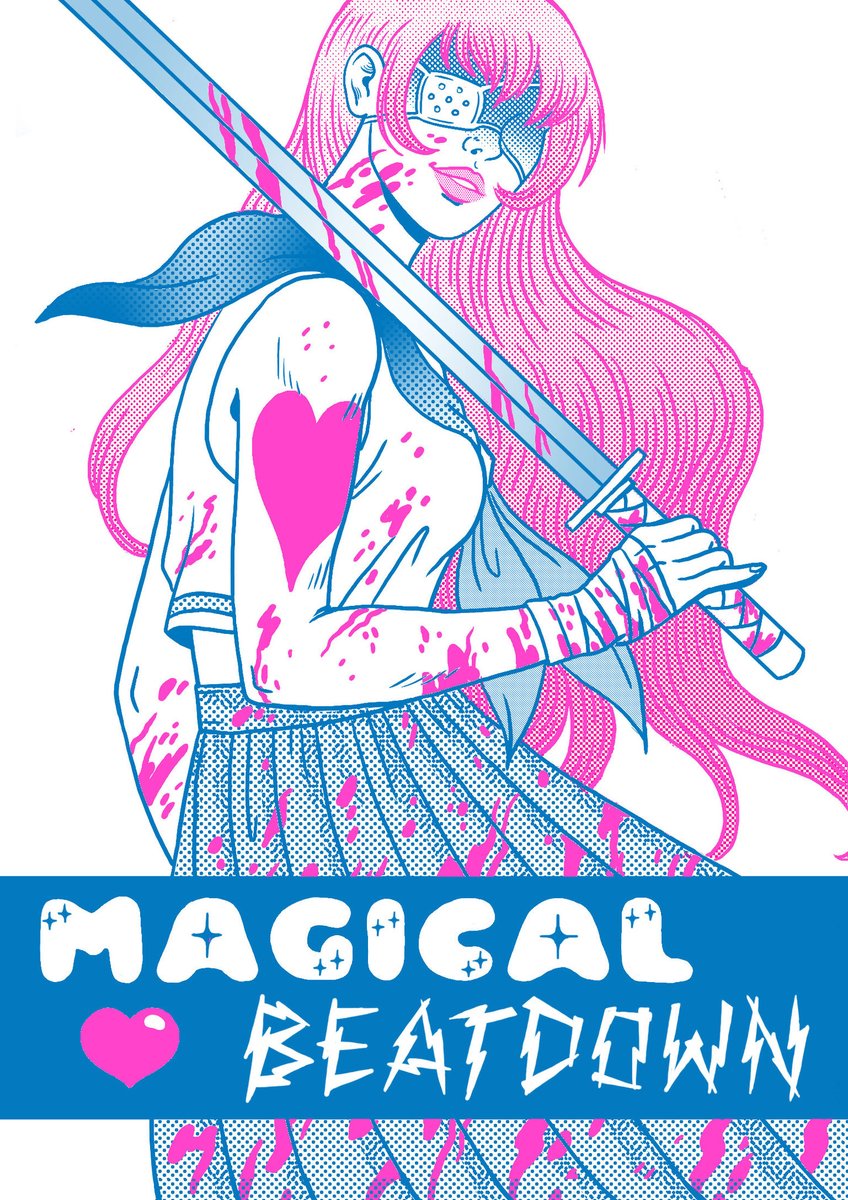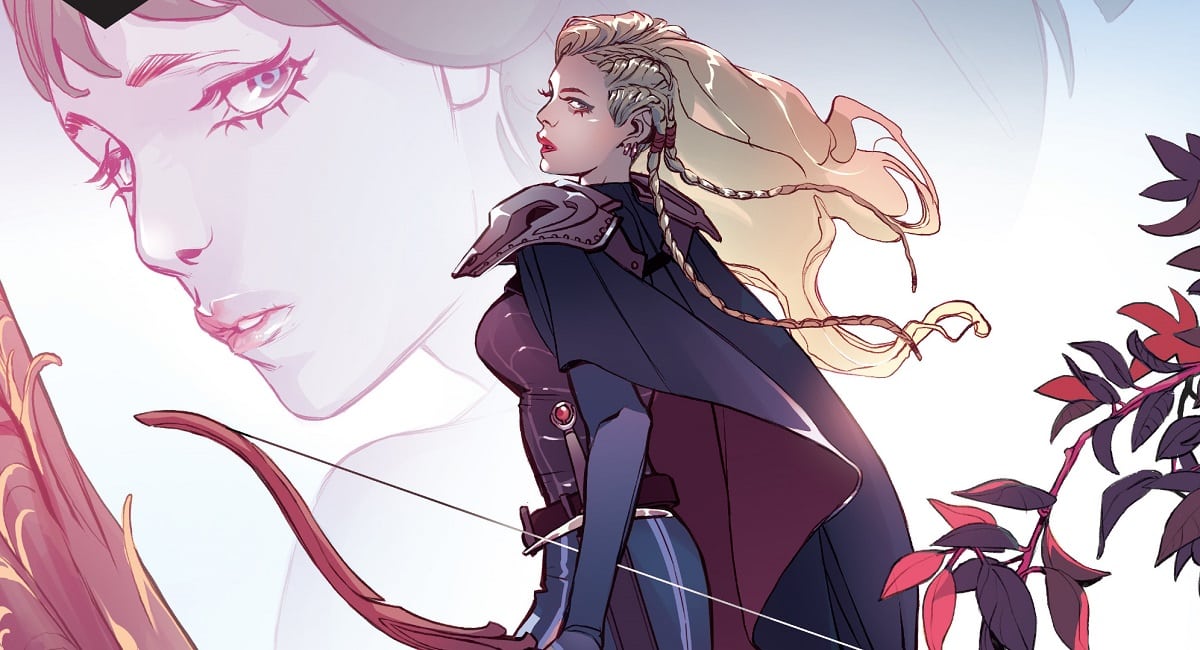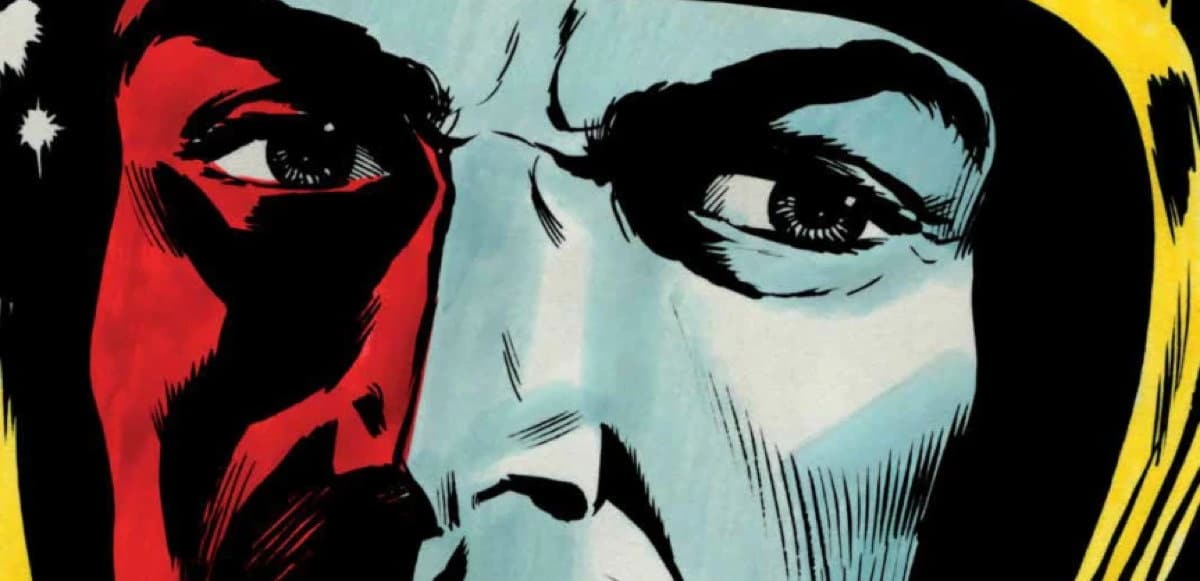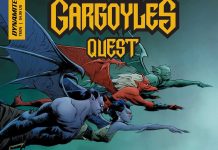Toronto-based artist Jenn Woodall‘s 2017 art zine GIRLS is a treatise on rebellion with a heavy dose of girl power that focuses on self defense and bashing back against the patriarchy. Likewise, her Magical Beatdown comics explore one magical girl who uses her power to destroy men who degrade her. Whether they employ verbal or physical harassment to invade her space, these men don’t live long — and the catharsis in that, especially as it’s explored through Woodall’s use of monochrome blues and pinks, is incredible.
The Beat caught up with Woodall via e-mail to discuss her Magical Beatdown comics, the inspiration she found in manga, and the need for art and comics that feature women and girls reclaiming their space and their bodies.
Samantha Puc: What inspired you to create comics about women and girls bashing back?
Jenn Woodall: I don’t remember if there was a moment or something specific. I think it just came about through feeling frustrated as a woman navigating the world. I used to fill up sketchbooks with marker illustrations of tough girls while I was in college and I always had the notion that my frustrations with being a woman were very isolated and personal, and it wasn’t until I talked to other people that I figured out many people feel the same way.
Something that inspired me was that I was annoyed with how different genres were treated in comics and media. I really love both shonen and shoujo manga and I often saw that people would dismiss shoujo entirely and champion shonen stories as better in terms of story, art, etc. So originally, I made Magical Beatdown as a mash-up of what I really loved: this archetypal, unbeatable hero, fight scenes and hyper-violence, magical girl tropes, romance and lots of hot pink. Once I made that comic, it kind of set the pace for the type of work I made in the future.
Puc: How has the social and pop culture climate changed since you first began producing work in this vein?
Woodall: I made the first Magical Beatdown comic in 2013 and since then, I definitely feel like I see more artwork and content in a similar vein. Not to say that I was the originator by any means. I think it has to do with people with similar experiences as a young person becoming adults and making art inspired by that content. You’re seeing all these creators making content that are inspired by the same stuff from our collective childhood influences. We’re also seeing people using their art to express their own personal opinions and experiences regarding socially accepted ideas that we grew up with, such as gender roles, sexual orientation and identity. I also remember, prior to making the first volume of Magical Beatdown, feminism was much more of a dirty word and I feel like discussing sexism and social justice issues wasn’t as common as it is now. We’re also seeing more diversity in who is creating artwork and the people represented in said artwork. I think a lot of things have changed for the better, regarding art and comics specifically.
Puc: Why do you think comics that explore self defense are important?
Woodall: I think it’s important because that type of representation makes people feel really empowered. I remember watching TV shows like Power Rangers growing up and thinking the Yellow Ranger was the coolest. It definitely gave me an interest in self defense and was an early example of seeing powerful women able to defend themselves. I think that the representation of seeing women and folx being able to defend themselves and be equal participants in an action-oriented story is very empowering. And I think knowing self defense also gives you a level of confidence in yourself navigating the world.

Puc: What kinds of feedback have you gotten from readers on books like GIRLS and comics like Magical Beatdown?
Woodall: It has been overwhelmingly positive, which has been an amazing surprise. Magical Beatdown was my second comic I ever printed and put out into the world, and I was ecstatic to even sell out of the first print run, which was only 50 copies. And similarly with GIRLS, it was originally just a risograph art zine I made of my personal illustration work for a zine fair in Toronto. I’ve gotten so many lovely messages from people expressing the positive emotional impact my work had on them and it’s an amazing feeling. I make stuff that I really love or that a younger me would have really loved to see. I didn’t think about these projects beyond that, so it’s great to make something so personal and have this kind of reception.
Puc: Ideally, what do you want readers to take away from your work?
Woodall: I really try to have readers take away a sense of empowerment, catharsis and escapism. I feel really lucky I got to watch so many things as a kid, especially anime, that had incredible female characters. So I really draw on that feeling to inform my work. And like many women and folx, I really hate being harassed, obviously. It is a frustrating and at times, terrifying situation. And sometimes it happens so quickly, you don’t have time to even address what happened. So I think of Magical Beatdown as a cathartic comic in that aspect, like an anger-fueled fantasy that hopefully makes you feel better about those experiences. I’m a big fan of escapism and I do feel like men get more escapist media than other people do. I sometimes feel frustrated that stories that center around women and folx seem to hinge on suffering and pain. I just want more stories where any person can see themselves as the hero of some fantastic story and totally lose themselves in fantasy. I think that’s important.
Puc: Are there additional volumes of Magical Beatdown coming?
Woodall: There is at least Volume 3 coming, but I haven’t really thought about the series farther than that. I’ve just been taking the comic one volume at a time, planning the next one whenever I get a good idea for the central concept or plot. My initial plan was to do 5 volumes but I’m not sure why I decided that. I’ll probably just continue to work on it as long as I’m having fun and I feel like a new volume is warranted.
Puc: How did you come up with the idea to use a “magical girl transformation” in the Magical Beatdown comics?
Woodall: I just wanted to pay homage to one of the genres that inspired this work. I was obsessed with the transformation sequences in Sailor Moon and other magical girl series as a kid. I thought they were so beautiful and stylish and they really burrowed deep into my brain in terms of artistic influence. And I put it in there as a nod to the reader as well, like, ‘hey, remember Sailor Moon? Me too, it’s great!’
Puc: On the subject of magical girls — do you have a favorite? Do you ever try to channel her in your work?
Woodall: My favourite magical girl series is definitely Sailor Moon. It was the first girl magical girl property I watched as a kid and it started me down the path of reading manga and watching anime. My favourite growing up was definitely Sailor Moon herself and I think that was in part because I was a pretty sensitive kid who cried a lot, so it made me feel better about being a crybaby.
Nowadays, I still really love Sailor Moon, but my favourites are Sailor Uranus, Jupiter and Mars. I’d definitely say I channel my love of Sailor Jupiter into Magical Beatdown, as both Jupiter and the heroine of my comic share brute strength, magical powers and a complete inability to tolerate random assholes. And there is definitely some inspiration from Sailor Uranus as well, considering Magical Beatdown‘s heroine also rides a motorcycle and has a girlfriend.
Puc: If people are looking for more media in the same vein as your work, what would you recommend?
Woodall: I would recommend watching Madoka Magica, which is one of my favourite magical girl series but with a darker and more realistic direction. I’d also recommend watching the classic Sailor Moon and Cardcaptor Sakura series for anyone that missed them because they’re really excellent. I follow so many artists online and I really love the work of Instagram users Hexelot and Peomichie. I think they explore a lot of similar themes that I tried to touch on in my GIRLS zine.
I’m also a huge fan of Love and Rockets by the Hernandez brothers and the Jamie Hewlett run on Tank Girl. I also love the manga group CLAMP and their manga, X/1999 is one of my favourites. It’s a gorgeous shoujo manga about the apocalypse filled with blood and violence. I definitely read that too young, but it’s amazing.
Puc: Is there anything else you’d like to add?
Woodall: Thank you for interviewing me! Hopefully Volume 3 of Magical Beatdown will be available sometime soon!
To purchase Jenn Woodall’s comics, zines and art, you can visit her shop. San Francisco indie publisher and art-crew Silver Sprocket also carries her work, including enamel pins, patches and t-shirts. In addition to working on independent projects, Woodall also illustrated the book Girl Squads: 20 Female Friendships That Changed History, written by best-selling author Sam Maggs.
To keep up with Woodall on social media, follow her on Twitter and Instagram. Check out the covers for Magical Beatdown volumes 1 and 2 below.


